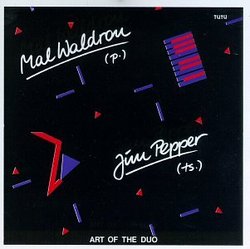| All Artists: Mal Waldron, Jim Pepper Title: Art of the Duo Members Wishing: 3 Total Copies: 0 Label: Tiptoe Release Date: 1/5/1994 Genre: Jazz Styles: Modern Postbebop, Bebop Number of Discs: 1 SwapaCD Credits: 1 UPCs: 063757810629, 4015728881066 |
Search - Mal Waldron, Jim Pepper :: Art of the Duo
CD Details |
CD ReviewsOne of my all-time favorites Jan P. Dennis | Monument, CO USA | 06/15/2003 (5 out of 5 stars) "When Jim Pepper and Mal Waldron first played together in 1988, something special happened. Captured on that marvelous disc, Mal, Dance and Soul, it was truly a serendipitous meeting. It was as if both had, unwittingly, been moving toward each other to find, near the end of their lives, their jazz soul-mate. Lucky for us, Horst Weber, listening in the booth, was astute enough to realize that something magical was going down, and came up with the idea of recording and entire album of them in a duo setting.They make an unlikely pairing, although both bring a kind of rough-and-ready approach to jazz, both are steeped in the blues, and both are quite expressionistic. That's about where the resemblances end. Waldron is an African-American, Pepper a Native American. Waldron spent his career mining the darker-toned aspects of jazz, while Pepper almost always conveys a kind of up-beat, almost jaunty, sensibility. Both are quite unconventional players, but in different ways. Waldron likes repeated, rolling figures, and uses them to slowly build tension and emotional weight. Pepper likes to go straight for the emotional heart of a tune, and then, after giving it a rather straightforward albeit highly charged reading, embellish it with deep-felt, often startling, reconfigurations. Regarding the tunes, the one that always gets me is the first of two takes of Pepper's unaccompanied reading of "Somewhere Over the Rainbow," which was to become a kind of signature tune for him (along with, of course, his great hit, "Witchi-Tia-To"). Both takes, coming back to back for easy comparison, are great, and provide the listener a glimpse into Pepper's unbounded creativity. The first goes for the inherent beauty of the tune. The second takes a lot more liberty with it and puts Pepper's solo brilliance fully on display. When playing together (as they do on all but the two "Rainbow" cuts), they prove equally adept with standards and originals. Of the former, their reading of the Tad Dameron classic, "Good Bait," and Thelonius Monk's "Ruby My Dear" stand out. Of the originals, I particularly like "Spinning at Trixi," a Waldron blues featuring Pepper on soprano, and Pepper's "Indian Water," with him again on soprano (he plays tenor on most cuts). The two tunes, both of which are very fetching, not only dramatically demonstrate their radically different approach, but also show how, despite their fundamentally diverse conceptions, they seem to mesh almost seamlessly. "Spinning at Trixi" begins with a typically dark and rolling Waldron figure, gritty, propulsive, and very declarative. Pepper manages to completely get on board with the vibe without substantially altering his approach, providing provocative commentary and dialog. "Indian Water," another signature-type tune for Pepper, fairly dances and glides along with a beguiling melody of lilting, flowing lines. It wouldn't seem that Waldron's approach could possibly fit into such a tune, but, surprisingly, it does. In a sense, each player seems to provide the missing element in the other's approach, and, when linked as playing companions, something emerges from their interplay that would've remained obscured had they not coaxed it out of each other with their totally different sensibilities.Jim Pepper remains a somewhat obscure figure in jazz history. Although he made a number of fine records as leader (I have 11 in my personal collection), few of them are still in print. If he's remembered at all, it's probably for his huge hit, "Witchi-Tia-To," brilliantly covered by the Swedish sax master, Jan Garbarek (it's also a staple of his live performances). Pepper's first album, Comin' and Goin', originally on Antilles, then reissued on Polygram (and now out of print), contained the hit version of "Witchi-Tia-To" and also featured an incredible band, including John Scofield, Kenny Werner, Mark Helias(!), Nana Vasconcelos, Hamid Drake(!), Bill Frisell, Colin Walcott, Ed Schuller, and Danny Gottlieb. Certainly worth hunting down, it contains some brilliant tunes and stellar playing throughout, but it is vitiated somewhat by inferior material ("Ya Na Ho," "Squaw Song," and "Custer Gets It") that would've better been left off, although these were obviously close to Pepper's heart and considered by him to be part of his mission to convey Native American sensibilities to white America and beyond. If you find yourself drawn to this fine and underrated artist, as I have been, you will want to search out his other remarkable recordings, especially, the studio discs Dakota Song and The Path, both of which feature Kirk Lightsy (piano), Santi DeBriano (bass), and John Betsch (drums), and the live albums Remembrance and Flying Eagle (and, really, any others of his; there's not a dog in the bunch)..In the end, Pepper, who died in 1992 of brain cancer, was probably something of a jazz prophet--not without honor except in his own country. During his lifetime, he was highly regarded and valued in Europe (most of his recordings coming on the German Enja label or its subsidiaries) where he was considered a major figure. My own feeling is that, if he is not at the very first rank of modern American jazzmen, he is certainly someone no jazz fan should be unaware of, and everyone would do well to own at least a couple of his recordings. This is as good as anywhere to start."
|

